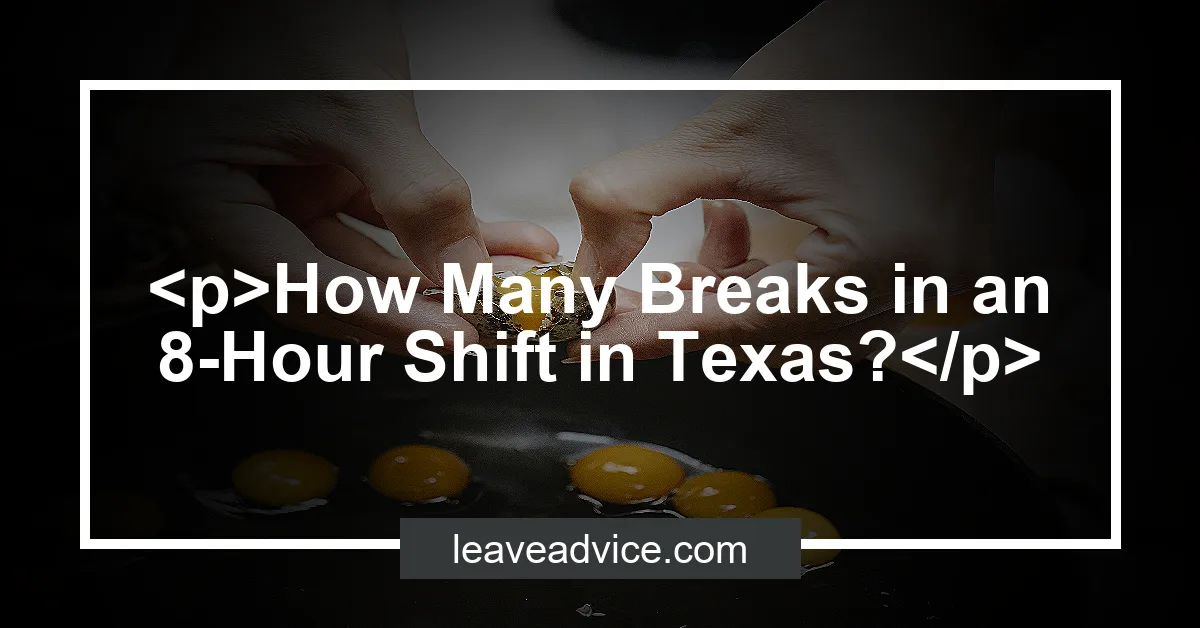How Many Breaks in an 8-Hour Shift in Texas?
How many breaks are employees entitled to in an 8-hour shift in Texas? The answer is: it depends.
There is no law in Texas that requires employers to provide breaks, but many employers do offer them as a matter of policy. If an employer does offer breaks, they must follow the rules set forth by the Fair Labor Standards Act (FLSA).
The FLSA requires employers to provide a 30-minute meal break for every 8-hour shift. Employees are also entitled to two 10-minute rest breaks for every 4-hour shift.
However, these breaks are not paid, and employers are not required to allow employees to leave the worksite during these breaks.
It is important to note that these are just the federal requirements. Some states may have more stringent requirements.
For example, California requires employers to provide a 10-minute rest break for every 4-hour shift, and a 30-minute meal break for every 5-hour shift.
If you are an employee in Texas and you are not sure whether you are entitled to breaks, you should speak to your employer. You can also contact the Texas Workforce Commission for more information.
Check out this YouTube video to learn how many breaks you get in an 8-hour shift at Buc-Ee’s in Texas:
How Many Breaks Are Required in an 8-Hour Shift in Texas?
There are no mandatory breaks required by Texas law for an 8-hour shift. However, many employers choose to offer one 30-minute meal break and two 15-minute rest breaks.
- Meal break: Employees are entitled to a 30-minute meal break if they work for more than 6 hours in a row.
- Rest breaks: Employees are also entitled to two 10-minute rest breaks if they work for more than 8 hours in a row.
These are just the minimum requirements, and employers may choose to offer longer breaks or more breaks.
What Happens If an Employer Does Not Provide Breaks?
If an employer does not provide breaks, they may be violating the Fair Labor Standards Act (FLSA). The FLSA requires employers to provide employees with a 30-minute meal break if they work for more than 5 hours in a row, and a 15-minute rest break for every 4 hours worked.
Employees who are not given breaks may be entitled to back pay and other damages.
Here are some of the things that can happen if an employer does not provide breaks:
- Employees may be more likely to get injured on the job.
- Employees may be less productive.
- Employees may be more likely to quit their jobs.
- Employers may be subject to fines and penalties.
If you are an employee who is not being given breaks, you should talk to your employer about the issue. If your employer does not resolve the issue, you may want to file a complaint with the Wage and Hour Division of the U. S. Department of Labor.
How to Get Help If You Are Not Getting Breaks
If you are not getting breaks, you should talk to your employer. If your employer does not take action, you can file a complaint with the Wage and Hour Division of the U. S. Department of Labor.
Here are some steps you can take to get help if you are not getting breaks:
- Talk to your employer. The first step is to talk to your employer about the issue. Explain that you are not getting the breaks that you are entitled to under state or federal law. Be sure to keep a record of your conversation, including the date, time, and what was said.
- File a complaint with the Wage and Hour Division. If your employer does not take action to resolve the issue, you can file a complaint with the Wage and Hour Division of the U. S. Department of Labor. The Wage and Hour Division is a federal agency that enforces labor laws, including laws regarding breaks. You can file a complaint online or by mail.
Here are some resources that can help you if you are not getting breaks:
If you are not getting breaks, you have rights. Do not be afraid to stand up for yourself and get the help you need.
Conclusion
Employees in Texas are not required to be given breaks by law. However, many employers do offer breaks as a matter of policy.
If an employer does offer breaks, they must follow the rules set forth by the Fair Labor Standards Act (FLSA). Employees who are not given breaks may be entitled to back pay and other damages.
Here is a summary of the break requirements under the FLSA:
- Employees who work six or more consecutive hours are entitled to a 30-minute meal break.
- Employees who work more than ten consecutive hours are entitled to a second 30-minute meal break.
- Employees who work less than six hours are not entitled to a meal break, but they are entitled to two 15-minute rest breaks.
It is important to note that these are just the minimum break requirements under the FLSA. Employers may choose to offer more generous break policies.
If you have any questions about your break rights, you should speak to an employment lawyer.

